
Cancer is Me
Tanya Bhatia has had breast cancer for most of her adult life. Her first diagnosis, at age 23, took her by surprise and left her isolated and depressed. “I never wanted to have that experience again,” she recalls. So when her second diagnosis came, she chose to handle it differently. “I’m going to live my life,” she says. “And I’ll just add chemo to my routine.” Now 33 years old and battling metastatic, triple-negative breast cancer, Tanya shares how she manages the “routine” of living with a life-threatening illness. It’s a fascinating conversation about coexisting with the knowledge that life is fragile and unpredictable.
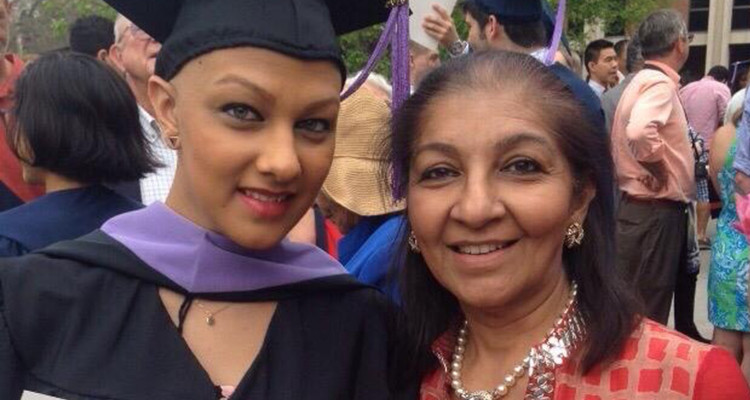
Tanya Bhatia with her mother. Tanya’s parents supported her throughout her experiences with cancer.
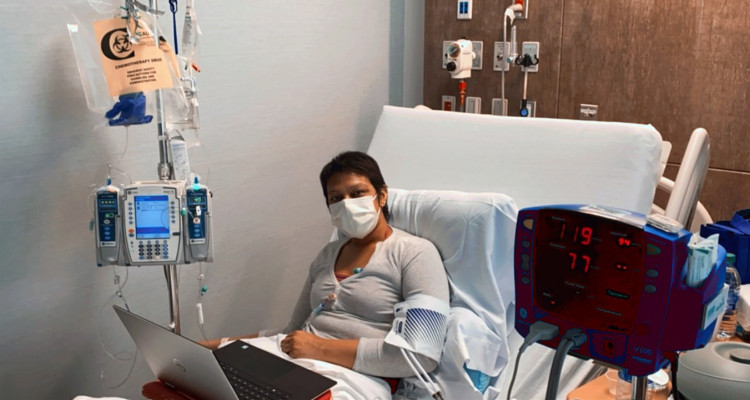
Since she has stage 4 cancer, Tanya has had to continue with chemotherapy even during the coronavirus pandemic.
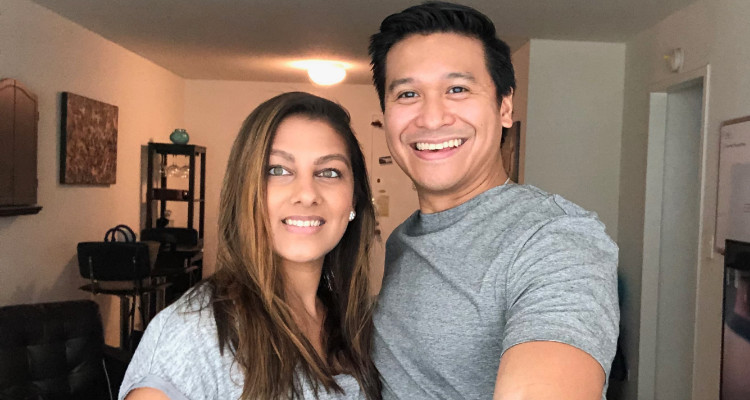
As much as she can, Tanya tries staying active, working, exercising, traveling and being social while undergoing treatment.
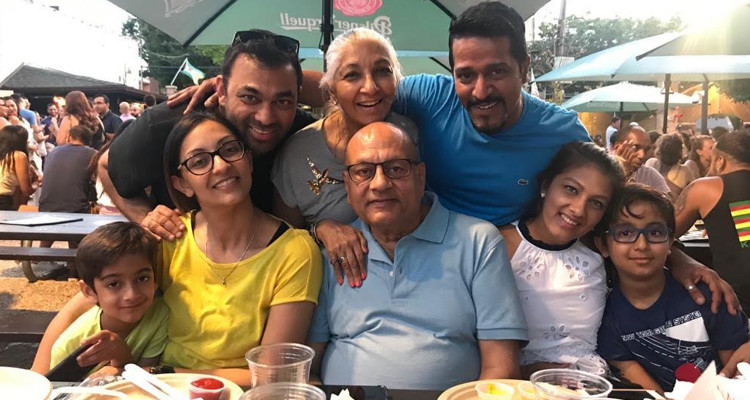
Tanya’s family provides her support and love as she underwent cancer treatment four times over the past decade
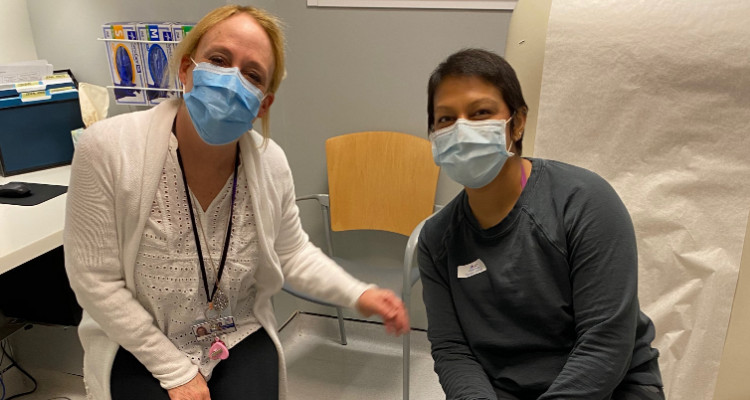
Tanya with Dr. Amy Tiersten at the Dubin Breast Center.
Podcast Transcript
Host: 00:00
From the Mount Sinai Health System in New York City, this is Road to Resilience, a podcast about facing adversity. I'm Jon Earle.
Dr. Amy Tiersten: 00:09
My impression of Tanya has always been that she's a beautiful person inside and out. She's very intelligent and she has a kind of resilience even in the face of having a terrible diagnosis of metastatic triple-negative breast cancer.
Host: 00:26
Dr. Amy Tierston is an oncologist here at Mount Sinai. Tanya is her patient and my guest today.
Dr. Amy Tiersten: 00:31
She has continued to keep her life very normal in terms of traveling, doing things with friends and her partner, working full-time. She's continued to exercise and really take care of herself with a healthy diet, exercise, and again, really living her life. And I think it's very admirable and inspiring.
Host: 00:50
Everybody I interview for this podcast has been through something. For most of them, it's in the past. But every once in a while, I talk to somebody in the thick of it. Tanya Bhatia is one of them. She has a life-threatening cancer, but if you're bracing yourself for a tear-jerker, don't. It's not that kind of story. This interview is about living. Living with the knowledge that life is fragile and unpredictable. Tanya's 33, she's had cancer for most of her adult life. And what's interesting is that she's figured out how to thrive anyways. She's found a balance between hard facts and optimism. Between treatment and normal life. It's pretty amazing.
Tanya Bhatia: 01:27
I'm Tanya Bhatia. I was born and brought up in the Middle East on a tiny Island called Bahrain, right next to Saudi Arabia and Dubai. I was diagnosed with my first cancer at 23 when I moved over to Berlin for treatment. And then I moved to the United States and I've been working here full-time as an interior designer.
Host: 01:53
What's it like to be asked to be on a podcast about resilience?
Tanya Bhatia: 01:56
I was a little bit afraid at first, but I think it's good for me to put myself out there. I've been trying this new thing where I try to get into some kind of uncomfortable situations or situations that I'm not used to.
Host: 02:12
What's driving that?
Tanya Bhatia: 02:13
I think a lot of it is about just people aren't aware about cancer and resilience and how to go about it. And I think a lot of people are afraid to ask questions. A lot of people are afraid to come clean with their doctors or have open conversations with their doctors. And I think all of those things play a huge part in resilience.
Host: 02:37
And in your feeling that you need to be more outspoken?
Tanya Bhatia: 02:40
Yeah, for sure. I mean, growing up, I was—I've always been such a quiet person, but I think I'm a completely different person than who I was 10 years ago. Like at 23, I was a very shy, quiet girl.
Host: 02:54
You've had cancer four times over the past 10 years, and I think people are going to hear that and they're going to think, "Oh, that's so unlucky. That's so horrible."
Tanya Bhatia: 03:04
Yeah.
Host: 03:04
I suspect that's not how you would view yourself.
Tanya Bhatia: 03:08
No, I don't think unlucky is the word that I would use. Sad. But it's okay. I'm very lucky to be where I am in my life right now. I'm very, very lucky. I'm happy to be around. I'm happy to be alive. There's so many things to look forward to. I'm in a great relationship with my boyfriend. I have great friends. There's nothing that I'm not looking forward to.
Host: 03:32
Tell me about what it was like for you to get your first diagnosis when you were 23.
Tanya Bhatia: 03:39
You know, it was weird. When I—I felt the lump and I knew right away. I just had a gut feeling. I knew. I don't know why I knew, I don't know how I knew, but I had a gut feeling and I knew right away that it was cancer. And obviously the first biopsy that I had was positive. And I was really scared. I'm not a very emotional person. I'm always the person who—if I'm crying about something, it's usually because I'm very stressed about it or that it's really, really, really affected me. But the cancer never made me cry. I cried when I saw my mom crying or I cried because of like being vain. I lost my hair. So I started crying. I was 23. I was like, "How am I going to live? I have no hair." That's the kind of things that bothered me at that age. Not the fact that I was undergoing treatment or that I felt like terrible all the time.
Host: 04:31
Where were you in life? What did it interrupt?
Tanya Bhatia: 04:33
Everything. Absolutely everything. I was in a relationship with somebody else. Thank God I'm not in that one anymore [laughs]. I just started a new job and I was there for, I want to say three to six months. I just started that job and I was doing really, really well. I had to uproot everything. Like it was either staying in the Middle East to get treatment, which I didn't trust at the time. And then I had an option to go to Berlin because my brother was moving there for work. So I chose Berlin because why not go to Germany for close to best treatment.
Host: 05:08
What was the treatment like? What was your mindset back then?
Tanya Bhatia: 05:13
It was terrible to be completely honest. Like I was in bed a lot. I didn't eat a lot. I never spoke to anybody outside of my family. I didn't have any friends there. I did make friends towards the end. And going through something like that at 23 was just horrible, you know? The treatment was rough. The surgery was rough. The pain was rough. Making all these decisions that I didn't know that I'd have to make that came with cancer and chemo. I had to make all these fertility decisions and not knowing what the future held for me. It was just horrible.
Host: 05:53
How would you compare your mindset then to now?
Tanya Bhatia: 05:56
Oh, completely polar opposite! Yeah. Like the second time that I got diagnosed, I was already in New York. I had just moved to New York, actually from upstate. And my mom was like, "Oh, I'm coming right there. And I'm going to take care of you. It's going to be same as Berlin all over again." And I was like, "Look, mom, you can come and you can help and be there for me throughout my treatment. And I really appreciate you being here for me, but I'm going to live my life. I'm not going to stop working and I'm not going to stop myself from doing other things. I just want to keep doing what I'm doing. I want to live my life as I'm living it now. And I'll just add the chemo into my routine."
Host: 06:40
What I'm curious about are the steps that got you from point A to point B. It's like, if I understand correctly, point A was really a pretty isolating place, where your cancer treatment interrupted your entire life and it became--your entire life kind of circled around your treatment.
Tanya Bhatia: 06:56
Yeah.
Host: 06:56
Versus point B is, "I'm going to live my life and cancer is just going to be a part of it."
Tanya Bhatia: 07:02
Yup.
Host: 07:02
Take us through that journey of A to B.
Tanya Bhatia: 07:05
Well, I never wanted to have the same experience again. I was so new to everything in the cancer world. I had no idea that it would be me that got the cancer at 23. I had no idea why it was me. I had all these questions in my head like, "Oh, why am I doing this? Is this the right decision?" I had no idea what I was doing. And having that experience actually brought me to point B where I'm like, "No, I'm never doing that to myself again." It was not good for me, for my mental health. It was not good for my physical health. It just wasn't good. I needed more of a—I needed more of a support group outside of my parents. Like my parents are great. I love them for everything that they've done for me. My brother's great. My sister's great. They've all been there for me throughout this treatment and they've done so much to help me get through it. But it really opened up my eyes to be in New York. And I'm like, I'm not going to miss out on things. I don't want to stop life just because I'm getting treated for cancer. So it's just going to be a routine thing. Like the same way that I brush my teeth, I'll go to chemo. Or the same way that I have to shower every day, I'll go to chemo and I'll just make it a part of my routine thing that I have to do. I just have to make time for it.
Host: 08:21
You know, when I hear you say, "I just, wasn't going to let it interrupt my life." I'm just struck by the will to do that and to stick with it. Was that something you were just able to flip a switch?
Tanya Bhatia: 08:33
Yeah pretty much.
Host: 08:33
Or did you have to work towards it?
Tanya Bhatia: 08:34
No, I flipped a switch. I was like, this is not going to be something that I let--I'm not going to let it take over. It's just, I know it's going to be a rough journey. I know it's not going to be easy. And I know I'm going to have to adapt a few things, but I will make it work.
Host: 08:51
You talked about cancer being a part of your life.
Tanya Bhatia: 08:55
Yeah.
Host: 08:55
What does that look like in practice? You get up, you brush your teeth, you check on your cancer? What is it like?
Tanya Bhatia: 09:01
Yeah. Basically get up, brush my teeth, take my chemo pill when I was on it, and then go about my day. And I know I have, like, my job is very demanding sometimes and I have a lot of deadlines and things. So I just add it to my calendar. Like cancer has to be a part of my calendar. You know? It's just a part of the routine. It's just one day at a time. And it is what it is. Like you're going to have good and bad days. You're going to have good and bad days at work. You're going to have good and bad days with chemo. You're going to have good and bad days with cancer. So you just kind of have to deal with it.
Host: 09:36
It is what it is.
Tanya Bhatia: 09:38
Yeah.
Host: 09:40
That's your thing.
Tanya Bhatia: 09:43
It's funny. I have the same--my mom says the same thing, but in Sindhi. The exact translation of that is, "It is what it is."
Host: 09:53
How does it sound in Sindhi?
Tanya Bhatia: 09:54
[Speaking in Sindhi] Sounds the same, right?
Host: 10:01
Did she impart that thought to you?
Tanya Bhatia: 10:04
Actually, it was my mom's mom and my dad's mom. And they always say, "It is what it is. You just have to face it." And that kind of started like with different things in life that happened well before my cancer life even started. And, you know, there are so many things in life that so many people experience and they go through, it's very difficult to go through cancer now four times, but there has to be some drive in life. Like you have to keep going. Because if you give up, there's nothing really—there's nothing else to live for. I mean, you have to do it for yourself. And I think that's been a huge, huge part in my life.
Host: 10:45
You have this very practical mindset, but I imagine that sometimes, maybe you waiver from it. How do you bring yourself back?
Tanya Bhatia: 10:55
You know, I always tell myself that I really have no choice in this matter. Like I wasn't given that choice. It is what it is, again. I have to fight it. And two days ago when Dr. Tiersten called me, she called me literally 10 minutes before I was about to present to a client. I had 10 minutes to bring myself back to feeling okay. I was anxious. I felt like I was going to cry, but I didn't want to cry. I was scared. I wasn't 100 percent sure of why this was happening. And again, I was like, "Whoa, you have to present in 10 minutes to a client on Zoom and you have to keep it together. You have to get yourself and your mindset back to where it's supposed to be." So I always believe in like taking a couple of deep breaths between and bringing myself back to like this sort of mindset that I've always had. And I feel like the deep breathing really helps with that. I think just talking myself down in my head. You have to work on--you have to focus on what's at hand. You were just told some not so great news by your doctor, but it's not—"it could be worse" is what I also taught myself. You know, it could be way worse. Like the news could have been terrible. It's not terrible. It's a little—how do I say it—a little blip in my little schedule of what I have to do next? And I just have to keep telling myself, "It's going to work. If this doesn't work, the next drug will work."
Host: 12:38
Do you also give yourself space to wallow and feel sad ever?
Tanya Bhatia: 12:42
Yeah, for sure. I feel like when I get bad news and I'm going to cry about it, I always let myself, and then I have to give my moment to have a good cry and feel bad for however long it takes. I don't think anyone would be healthy mentally or physically if they didn't allow themselves to have that kind of emotion. You're allowed to cry about things. You're allowed to be sad. But it shouldn't stop you, and it shouldn't bring you down in your life. You have to keep moving forward.
Host: 13:13
Is there someone in your life or someone you've encountered who has kind of been a role model for you in terms of dealing with adversity?
Tanya Bhatia: 13:21
I don't think I have one specific role model. I feel like everyone's played a major part in my life that way. I definitely want to say that my family has been there for me a lot and played a major role in helping me get to where I am today. I feel like both of my doctors, especially Dr. Tierston, since I've been with her for five years or more, and my other doctor in Germany have played a huge role in getting me to where I am today. They've helped me understand a lot about cancer. I ask a lot of questions, and I think Dr. Tierston has, over the years, understood that I'm not going to go into an appointment without asking a hundred questions. And I also want every result released to MyChart so I can go look at it. And every time she makes a recommendation for a chemotherapy, I make her write it down and then I go Google it. Even though I know that Google is my worst enemy. And then I just do my own research because I feel more comfortable just learning about what other people are experiencing and what I potentially may experience. Even though I always tell myself that everyone's different and everyone's going to have a different experience.
Host: 14:36
Does having cancer change the way that you see other people going about their lives without having to deal with this?
Tanya Bhatia: 14:43
I mean, I always feel like I've had some setbacks just because of having cancer, but I don't think it's going to stop me in getting to where I need to be when I want to be there. I don't think it's ever stopped me from moving forward in life. I always look at other people and I'm like, "Wow, you're my age. And you've done all of these things. And I haven't even done this. But I've done this." Like, there's always things that I compare, and it's hard to see people our age and—everyone's at different stages in their life and there's no rush and there's no age limit to be where you need to be in life. Everyone has a different path and it's going to be fine.
Host: 15:25
Is there any sense that you're grateful for your cancer? Like it's taught you something important?
Tanya Bhatia: 15:31
So many things! So many things. It teaches you about life. It teaches you to appreciate life. It teaches you about people. Honestly, if I hadn't been diagnosed at 23 and all the other times that I've been diagnosed, I don't think that I would be where I am today. My life would have taken a completely different path. And it's weird to say it, but cancer is me and I am cancer and that's okay and I'm super grateful for where I am. I'm lucky to be around. I'm lucky to be alive. I'm lucky to be here. I'm lucky to be on this podcast!
Host: 16:05
We're lucky to have you! Say more about what it's taught you about people, about life.
Tanya Bhatia: 16:13
I've had so many experiences like I've met so many wonderful people in the cancer community and comparing them to other people in regular life, they're completely different. Their outlook on life is different.
Host: 16:28
How so?
Tanya Bhatia: 16:28
I think people who have been diagnosed with cancer, even if it's just been once, are just a little bit more grateful about anything and everything that they get in life. And it's a weird thing to say, but there are certain people who will just—they just don't appreciate anything that you do for them, or they don't want to be there for you because, I don't know, having a social life is more important than being there to support your cancer friends. Or, it's a weird thing to say, but I've come across so many people who are so judgmental about such little things. And I think where I am today and the people that are in my life today was the right path for me, which is why I'm so grateful.
Host: 17:16
Yeah. Any way I would try to sum up what you just said would feel like reducing it to a cliche. It's like, it teaches you to be grateful, right? It teaches you to not sweat the small stuff, maybe.
Tanya Bhatia: 17:28
Absolutely. It teaches you to appreciate your friends and your family a lot. It teaches you that you need to spend more time with your friends and family teaches you to appreciate all the little things in life. Even if it's good or bad, it teaches you that one way or another something will work out.
Host: 17:53
So you've connected with--would you call them, support groups or groups of women with cancer?
Tanya Bhatia: 17:59
Yeah. It's strange how I met a lot of these people, but yeah, not so much groups because I don't do well in big groups, but the women that I've met have been absolutely great. They've come from all different walks of life and, you know, they've taught me things and we've had great friendships. Some of them moved recently. Some of them are still in New York. Some of them want to introduce me to their other friends and introduce me to more of the cancer community, which I'm excited for. I would like to build my own little group of cancer people. That's okay. [laughs]
Host: 18:39
What have you learned from them?
Tanya Bhatia: 18:40
I think we all have very similar experiences with past friendships and past relationships and just seeing how we were treated. Seeing how, you know, certain people are in life and comparing those experiences has just been just eye-opening I think, really. It's interesting to see how different people respond to cancer, whether you're a caregiver or a cancer patient or a family member. Every person has a different response. And that's how you know how to build your little community or your little group of people. And you know who's closer to you, who's there for you and who will always be there for you. You know, it's easy to tell. And some friendships—like some people I've only known a couple of years and they're the closest people to me right now. Some people I've only known a week and I feel like I'm super close to them.
Host: 19:45
It's an incredible shared experience.
Tanya Bhatia: 19:49
It's been amazing. And I'm so grateful to have met all of the different people that I've met. So anyone who's willing to introduce me to anyone, really, I'm just like, "Hey! New friends—that's what I need." It's okay to have as many friends as I can and have my support group. That's what I call them. My support group is the people that I talk to almost every day, the people that I'm communicating on a daily basis with.
Host: 20:14
On a daily basis.
Tanya Bhatia: 20:16
Yep. And the people who are close to me and who I could pick up the phone and I could cry to them about anything under the sun, or if they ever have an issue, feel free to call me, you know, if they're upset about something or they're afraid of something.
Host: 20:28
You've said that cancer is not always a sad story. What kind of a story is it?
Tanya Bhatia: 20:33
I think it's whatever you make it out to be. And I think it's really easy for someone to get down in the dumps about it. And I don't think that that should be the approach. I think that cancer is not easy, everyone knows that, and going into it and being diagnosed is traumatizing and devastating for everybody. And everyone has that moment where they're just like, "Oh, my gosh. How did this happen? What did I do wrong? Did I eat something? Did I drink something?" Well, no, it doesn't work that way. And it's just understanding that it's out of your control and it's out of your hands. These are the cards that you were dealt, and this is the life that you were given. So it's how you interpret it and how you want to go about it, I think, is the best way to do it. How do you want to live your life? You should live your life the way that you want to live your life. And you shouldn't let cancer get in the way of that. A cancer diagnosis doesn't mean that it's like the end of the world. It doesn't mean that it's the end of your life.
Host: 21:33
What are your hopes and dreams for the future?
Tanya Bhatia: 21:35
I try not to plan that far in advance because I'm not sure what's going to happen. Anything could change. I just want to be happy. I just want to be living my life. I want to eventually open up a little business. I want a little restaurant. I want to hopefully be done with cancer and be in remission. I think that would be my biggest, biggest thing for the future. If I could get there, I can get anywhere after that. Nothing can stop me.
Host: 22:09
Tanya Bhatia. Thank you so much for being on Road to Resilience. It's been a pleasure.
Tanya Bhatia: 22:13
Thank you for having me.
Host: 22:17
Tanya Bhatia is an interior designer and a patient at Mount Sinai. She lives in New York City. Dr. Amy Tiersten, who you heard at the beginning of the episode, is a Professor of Medicine and the Clinical Director of Breast Medical Oncology at Mount Sinai's Dubin Breast Center. If you enjoyed this episode of Road to Resilience, please rate and review us on Apple Podcasts and share the episode with a friend. Thanks. We've got another podcast coming out. It's called "Real, Smart People," and it features audio profiles of some of the smartest, quirkiest minds in medicine. We're really excited to share it with you in the next few weeks. So look out for that. Road to Resilience is made by Katie Ullman, Nicci Hudson, and me, Jon Earle. Our executive producer is Lucia Lee. From all of us, thanks for listening. We'll see you next time.
